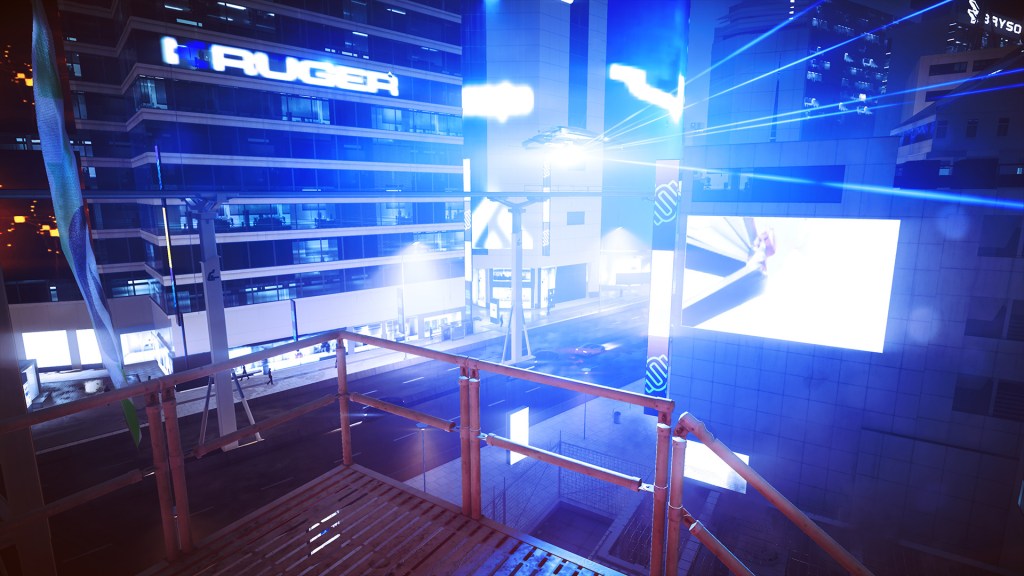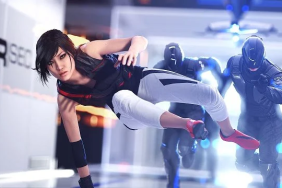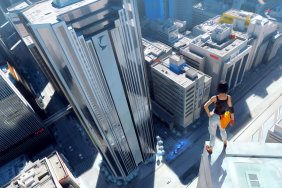There are only two things I fondly remember about the original Mirror's Edge: the art style, and the song “Still Alive” (not the Portal one) that played during the trailers which became its theme song. While the gameplay was novel, it was also undercooked, with poor combat mechanics that ruined the pacing of an already short game. Regardless, the game has garnered a cult following over the years, and those fans are finally being rewarded with the release of Mirror’s Edge: Catalyst this summer.
An open-world reboot/prequel of the original Mirror’s Edge, Catalyst looks to check off the requirements of the modern AAA Game. I had a chance to check out the closed beta over the weekend, and while it didn’t wow me (it is only a beta), it did still make for an enjoyable run.
The closed beta offered a few story missions and tutorials before kicking players to the white, white rooftops that adorn the city of Glass (the irony is not lost on me, dear readers). Speaking of glass, the developers have taken to the “if it ain’t broke” approach with Catalyst, maintaining the original game’s sharp contrasts and minimalist use of color. Objects of traversal affection are highlighted in a deep red, the so-called Runner’s Vision that strikes a nice balance between gameplay and artistic function. The game frequently reminds players that the highlighted path is not always the fastest, but for those of us who can barely jump to conclusions, this feature is appreciated. As before, players can choose to turn off this feature if they wish to scrape their virtual knees while carving their own path.
The idea of an open-world Mirror’s Edge is a potential parkour playground of polygonal perfection, itself a rebellion against the traditional modern open-world experience by emphasizing exploration and movement as opposed to combat and destruction. Moving Faith is thankfully intuitive with contextual buttons for moving over or under obstacles. Using momentum to springboard off railings, wall-run over fences and slide under pipes is fast, fun, and easy to do.
I did have the occasional accidental springboard off the roof when holding the contextual jump button for too long, but mastering the subtleties of the control scheme is part of the challenge. Additional movement abilities can be unlocked by gaining XP (because what game these days doesn’t also serve as an RPG?), and while some may balk at the idea of having to unlock a basic roll, it helps new players ease into the core experience.
Combat seems to be improved from the first Mirror’s Edge, but it’s not perfect. While the story missions made fun use of the combat mechanics, using your momentum to wall-run and kick enemies in the face without so much as a stumble, once Faith stops running the flaws come into focus. Engaging more than one enemy at a time is an almost guaranteed defeat, even though the game assures you that other enemies will not attempt to fight you if engaged in combat. (What a polite authoritarian society!).
There is a dodge button to help you get behind enemies, but it can sometimes be disorienting. Oh, and if the enemies are packing heat? Good luck closing the gap. While the developers have attempted to counter this imbalance by use of the Focus Shield, it feels more like a stopgap than anything. The Focus Shield is a meter that builds up as Faith keeps her momentum going, and when full allows her to dodge bullets like Neo during a runner’s high. It was difficult to tell if this ever worked, however, as the few enemies there were tended to group up in confined, unrunnable spaces.
The combat segments in the beta were thankfully sparse, but did serve to highlight just how little there was to do. Outside of the story missions, there was a few delivery missions to take on in addition to time trials, both of which are simple variations on the same theme (read: run fast). Players with a fondness for climbing can attempt to tag billboards, which thankfully does not result in the map being revealed. The only missions that were worth seeking out were the Security Hub missions, which involved fighting off a few enemies before shutting down a security terminal and fleeing the scene.
While the hubs featured in the beta followed the same basic pattern—fight, shut down, run—they did offer the most variety out of all the side missions. Outside of those hubs, there are no enemies to fight in Mirror’s Edge. This may be a blessing to those who just want to run, but it leaves much of the game feeling empty and boring. Players will occasionally run into (I say run a lot because all you do in this game is literally just that) other NPCs that do nothing but stand there. Seriously. Random characters hanging out on rooftops on a Tuesday. I understand trying to create a living, breathing world, but it’s a little weird to see normal citizens with no business on rooftops standing on rooftops. What kind of society is this?
Also included in the beta was the Mirror’s Edge Social Play feature, an asynchronous multiplayer mode that allows players to create their own races and share them with the world. Creating your own race is as easy as pressing a button, and new races will appear in-game on the map. Players can also drop Beats (not those Beats, though that would be a new kind of product placement) to mark areas of interest. It’s similar to the bloodstains in the Souls games, with much less death. It’s a neat feature, but as is, hardly qualifies as a substitute for live multiplayer. After all, we all know the best way to motivate yourself to run is to drag someone along with you.
Overall, Mirror’s Edge: Catalyst is shaping up to be a fleshed-out, more fully realized game than its predecessor. Keeping the original’s style and core mechanics while expanding around that was a smart move, but here’s to hoping that the beta is only a small slice of a much bigger, richer pie. Mmm, pie.







